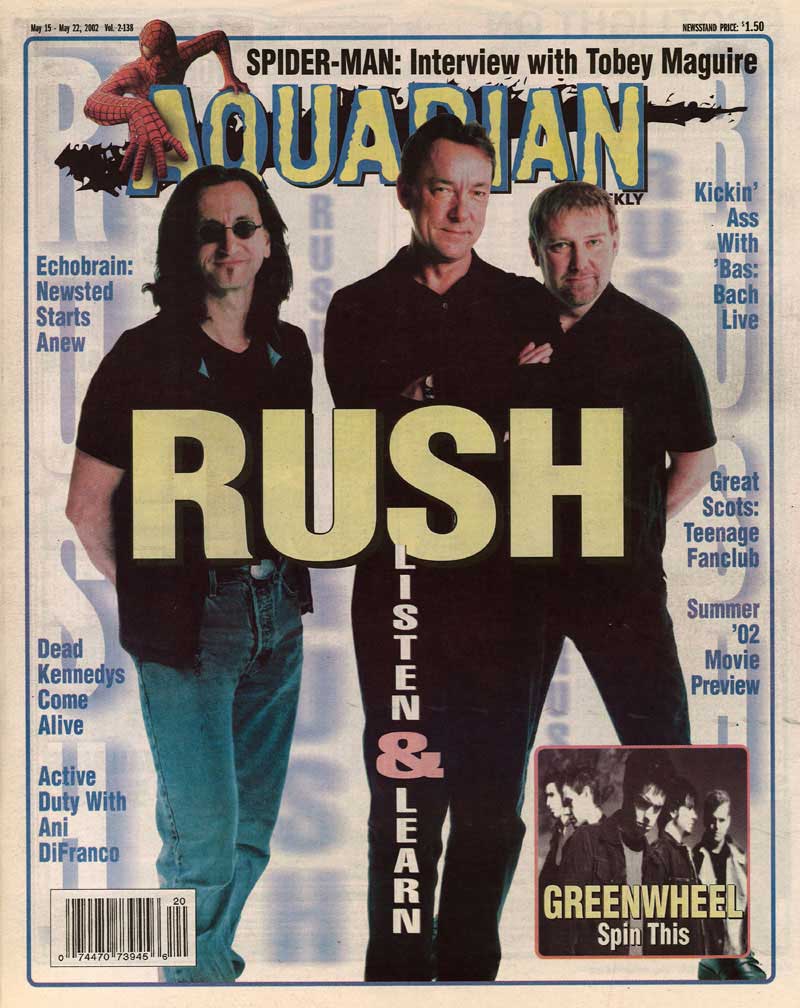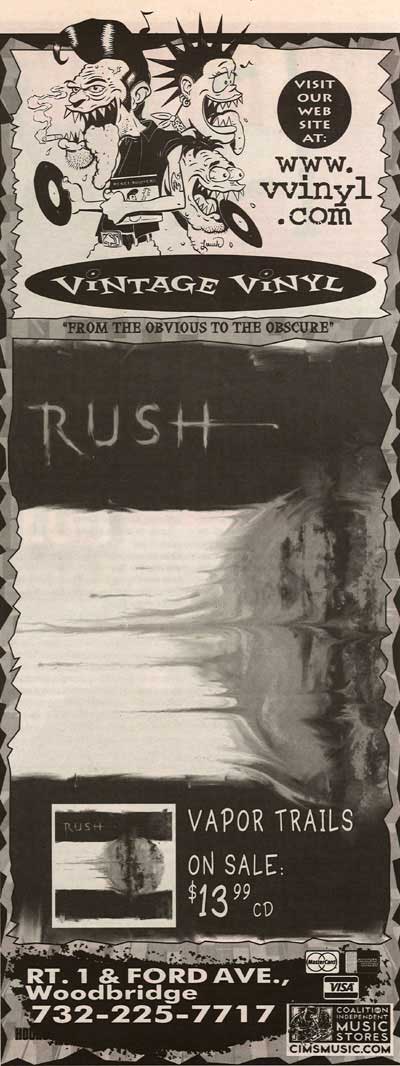One Little Victory
By Wes Soriano, Aquarian Weekly, May 15, 2002, transcribed by John Patuto

In 1997 Rush finished their Test For Echo tour and headed home to Canada. No one knew at the time that they would be gone for so long.
Through their nearly 30-year career, Rush have built what is arguably the most devoted following in rock music. That's why fans around the world were shocked and saddened when following the T4E tour, drummer/lyricist Neil Peart lost both his wife and daughter.
Rush fans were sympathetic to Peart and an outpouring of support from around the globe soon followed. Always hungry for new music, fans understood what was needed during this time and patiently waited for Peart, bassist/vocalist Geddy Lee, and guitarist Alex Lifeson to recover.
The wait is now over. The Canadian trio has returned after a five-year hiatus with their new album Vapor Trails, a collection of thunderous new tunes with undeniable power. Yes, it's true. Rush are back and better than ever. Geddy Lee and Alex Lifeson recently sat down with AW to discuss their break, the new album, and where they go from here. For me, having the chance to sit down and speak with my musical idols was an experience that can only be described as surreal, and certainly unforgettable.
How does it feel to be back after what's been the longest hiatus of your career thus far?
Geddy: It feels good. We're tired! (laughs) It's been a lot of work and a long job but I feel good about the way we did it. I feel good about the energy we've created so far.
Now that you're back and firing on all cylinders, what's it like to be working with Neil again?
Alex: Well, it feels very good. It was touch and go for a long time. It was a long, painful recovery but it's great to see him, as a friend, getting on with his life; finding some happiness, and getting stronger every day. It's nice to see him as a musician get back into playing drums, and really dive into it and finish this record feeling very proud about what he accomplished. It's been very, very positive for him as well as for us.
When you started recording Vapor Trails, did you approach things differently as far as writing and recording go?
Geddy: Well, this is a record that's quite different from anything else we've ever done. The circumstances are quite different, and there was no way to approach it like anything we've ever done. Many things have changed, so we had to set up an environment that allowed for that. That allowed time, that allowed us to make errors, and time to realize those errors and move on and try to figure out how we should approach making a new Rush album.
Vapor Trails is much heavier than what Rush fans might be used to...
Alex: Apparently!
Geddy: Who knew?! (both laugh)

Was it just what you were feeling while making the album?
Geddy: Yeah! It's just what happened.
Alex: It's funny, that comment has been made a number of times and we don't feel like we made a particularly heavy record but I guess...
Geddy: It's intense. I think we underestimated how intense it was.
While the melodies might not be like anything we've ever heard on Rush albums, it seems like we may have heard some of these sounds and ideas on both of your solo albums (My Favorite Headache [2000], Victor[1996]).
Geddy: Sure, some of that experience rubs off, but kind of in a natural way as opposed to saying, 'I'm gonna try to do something like I did on my record.' That doesn't go through your mind but you find yourself going to places, musically, that (we) had set the stage for, maybe on something I did on my record or something Alex learned from his experience. Those things just set you up for another step. It's not something you consciously chase. And sometimes it's completely subconscious. You find the music takes you to a place and then you step back and you realize that there may be a connection between that and something you did (in the past).
Alex: Yeah, for me too. Listening to Geddy's album, prior to us getting in the studio together, I ended up being very analytical about how I listened to it. It was very clear to me what his strengths were. And when we went in to work together I felt very relaxed about letting him follow his instincts in certain areas. There's this thing about wanting to be there all the time through every aspect of a project because you're concerned about it and you want to be totally involved in it. But it sure is great to be able to walk out of a room and have no fears about anything or concerns and, in fact, just have an eagerness to get back in to hear where it's gone. I know, for me, listening to what he did gave me that confidence. It made me feel much more relaxed.
You both feel like you could step out and leave it in capable hands?
Geddy: Absolutely.
Alex: Even more than capable hands. In fact, you become aware that you need to have that space alone to be able to fully develop your own ideas.
Geddy: Yeah, we developed a great tag team situation. I kind of got the sense that the two of us, as a team, could produce any kind of music in any style. I just got that sense that we had developed a great take, and were really filling each other's gaps really well. When I got confused about something, he would come in and (snaps fingers) instantly give a perspective to it. And vice versa. So we made a point of trying not to be in the room together too much during the end stages of the mix. We needed each other to maintain freshness.
Alex: That was really valuable at the end. I mean we were like a tag team. I'd walk in and (claps hands) and he'd go out for like an hour. Then he would come in and I'd leave. We never said anything, we just knew.
Geddy: I don't think we've ever worked so well together. Ever, ever, ever. We just really understood and cleared a lot of things up early. We maintained our focus, reminded each other when it was important to maintain focus, and didn't bicker about unnecessary stuff. We'd argue sometimes about what you're supposed to argue about: the betterment of the song. But generally, it was incredibly...
Alex: ... Ego-free.
How was it picking up the 'Fear' saga again?
Geddy: It's funny, we didn't realize we were doing that until Neil put together the list at the end of the record and tagged on that it was part four...
Alex: NINTH!! (laughs)
Geddy: (Laughing) Part 14 of 'Fear.' We had no idea. It was a song that dealt with fear but the connection with the other three songs was an afterthought. Those original three songs dealt with fear and how it takes hold of your life. And this does as well. It's a different take on it so it's quite appropriate that it's part of that group.
Can we expect any more stories to be continued or maybe some sequels to the epics?
Geddy: Yeah, there's gonna be lots of 'em! (laughs)
Alex: We're not finished with 'Gangster Of Boats' yet. There's still a lot of work to be done on that!
Geddy: That's right, we haven't worked on the famous Jerry Valence saga yet. Still got a lot of work left on that! (laughs). All the songs are connected and unless you get all the records, none of them make sense!
Your career has always been defined by having a very devoted following. What does it mean to you to get back out and bring the music to those fans?
Alex: Well, you know, it feels terrific. Our fans are very devoted. They're very patient with us and they've really stuck with us. We realize that this has been a very difficult period for them. They've been waiting for new music and of course their thoughts are with Neil and his recovery. And it feels great to be planning a show that we think will make a lot of our fans happy and reconnect us with them.
A lot of popular artists today would list Rush as a major influence. Are there any current artists who you listen to and would you like to try some things that they're doing?
Alex: Uh ... Brandy maybe?
Geddy: Well, you know, Celine Dion has been a big influence on my vocal style.
Alex: Geddy's going to hit his chest like she does.
Geddy: (In dead-on Celine impersonation) and I'm going to try to talk with a French-Canadian accent as well! (laughs)
Alex: I think the way we absorb music and trends is very, very subtle. I don't know if we listen to something and want to emulate it directly.
Geddy: But I'm inspired by what Radiohead is doing. I'm inspired by some of the stuff Primus put together. I'm inspired by Bjork's music. There are artists out there that make us want to go back and write some music right away. They're not necessarily Rush fans that inspire me.
As far as radio goes now, I don't know how it is in Canada, but in America the state of the medium is just horrible.
Geddy: Yeah, it's the same in Canada because all the same people own everything. I don't know how that happened but they've taken competition out of the radio marketplace and it's not healthy for bands or fans. I don't think, at the end of the day, that it's healthy for the industry. I think America is the home of the free ... except in the world of radio.
Alex: It's become all about selling ads. It's not about music.
Geddy: There's also the case where some stations make a judgment about a song because of the band (playing it). Some stations won't play Rush because we've been around longer than five years. Some stations have a policy where any band that's been around longer than five years won't get on the air. So rather than make a judgment on whether the song deserves to be exposed, they make a judgment on some concept of the artist.
Alex: In classic radio it's a similar thing. For a band like us, we're still a valid band. We're still recording material. We still have new music that we'd like to get heard on the radio but they won't play anything because it's classic and it has to fit in a certain chronological period.
Geddy: Anyway, some of it falls through the cracks and I think that's a symptom of a problem. And the problem is that the same people own everything.
Rush will be performing at PNC Bank Arts Center in Holmdel, NJ on July 11, 2002.